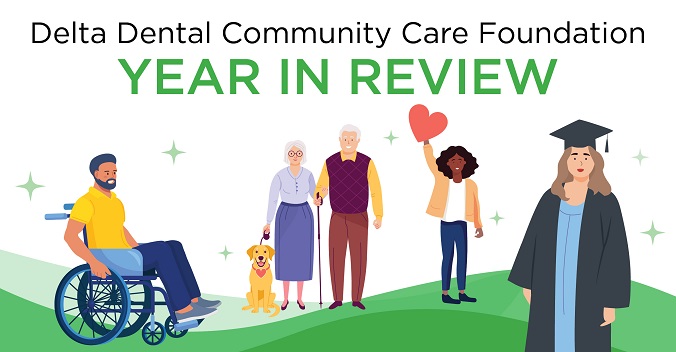
Filling communities with smiles: social impact in 2022
With ongoing inflation stress and COVID-19 anxiety, communities around the U.S. need support. Sometimes it’s obvious: If people are struggling to eat, feed them. But other times, addressing social needs means tackling the underlying issues.
That’s where the Delta Dental Community Care Foundation comes in. The philanthropic arm of Delta Dental of California and its affiliated companies, the Foundation is committed to building caring, resilient communities by increasing access to oral health care. Here’s how Delta Dental supported our communities this year.
Investing in underserved communities
Would you believe that nearly one in five adults between age 65 and 74 have lost all their teeth? Over age 75, that number grow to one in four.
It’s a scary issue. Older adults consistently struggle with oral health problems and aren’t able to get the support they need for proper dental care. Delta Dental’s first Senior Oral Health Survey Report revealed that 72% of Americans aged 50 and older wish they had taken better care of their teeth in youth. Yet many still aren’t doing so because their problems are too overwhelming to deal with on their own.
To help fight this oral health crisis, the Delta Dental Community Care Foundation is broadening our focus on senior oral health. In September, we launched a multi-year program to identify and address systemic causes of poor oral health among older adults, especially those living in poverty, people of color and those whose mobility issues keep them from receiving oral health care.
One such investment is the UCLA Dentistry MINDFUL Project, which will provide mobile dental care for underserved populations living in long-term care facilities. During its three-year funding cycle, the MINDFUL project will serve an estimated 6,500 patients by providing dental care in long-term care facilities. The project also aims to increase access by training providers how to provide care for patients with complex health conditions.

Gary Wright and his dog Leo on a park bench. Gary is a client of Meals on Wheels San Francisco.
Delivering mouth-healthy meals
The Community Care Foundation partners with nonprofits like Meals on Wheels San Francisco to provide consistent, healthy meals to those who need them.
Gary Wright is one of Meals on Wheels’ clients. A heart attack kicked off a chain of events that left him without paid health insurance and unable to afford the critical medical and dental care he needed. For years, dental care simply had to take a backseat.
His story is unfortunately common — many older adults in the U.S. struggle to take care of their oral health. Individuals served by Meals on Wheels may be at higher risk for oral health concerns due to limited mobility or living in poverty. Some Meals on Wheels clients need special diets including softer foods due to mouth pain or tooth loss, said Kenzie Ferguson, Vice President of the Foundation and Corporate Social Responsibility.
For Gary, the help he receives from Meals on Wheels has removed a burden from his shoulders. Instead of worrying about where he’s going to receive his next meal, he can focus on the things he loves, like walking his dog, Leo.
“We help to provide additional support for our seniors in ways that have a direct impact,” Ferguson said.
Fostering job opportunities in dentistry
To provide high-quality dental care to a community, you need dentists. As a part of our work, the Community Care Foundation invests in training for dental clinicians and assistants.
One such investment is in Howard University. In February, the Community Care Foundation announced the Delta Dental Endowed Scholarship for Opportunity program at Howard University College of Dentistry. The scholarships are offered to high-achieving and financially deserving students and will be awarded annually to new students or previous recipients.
The Foundation also partnered with the California Dental Association and the California Labor and Workforce Development Agency to launch Smile Crew CA. The Smile Crew CA program trains low-income or unemployed workers to become dental assistants and helps place them in dental practices around California. The program helps them start their careers in dentistry by teaching basic skills for dental assisting and providing required certifications.
It also aims to fill the gaps in California’s dental assistant shortage, which has restricted Californians’ access to care. Even before the COVID-19 pandemic, dental practices in California were facing a worker shortage. Enrollment in dental assistant programs has dropped 50% since 2010. According to the California Dental Association, 44% of practices are struggling to provide care to their patients due to the assistant shortage.
As of early 2022, more than 80 people have completed the program. Nearly 100% of participants were hired or pending hire at the end of their course!
The future
In 2022, the Delta Dental Community Care Foundation continued our work in service to our community. By partnering with our nonprofit organizations and community leaders, we increased access to oral health care, funded oral health education and supported organizations that serve vital needs in our communities.
Looking to 2023, we’re excited to continue supporting our communities as we look for new ways to invest in oral health research, education and care and bring smiles to the people we care about.
Recent posts
- Introducing DeltaVision® for midsize and large groups
- For open enrollment, clients want the perks and benefits of Delta Dental plans
- The connection between oral health and mental health
- Healthcare Spending Card¹ — a new way to pay for health care
- Stay up to date with broker continuing education courses
- Why is dental insurance important?
- Teledentistry helps members get the most out of dental coverage
- 6 reasons clients love our family-friendly dental plans for kids
- Give your clients more benefits with member perks
- New age limit for pediatric dental care under DeltaCare® USA
